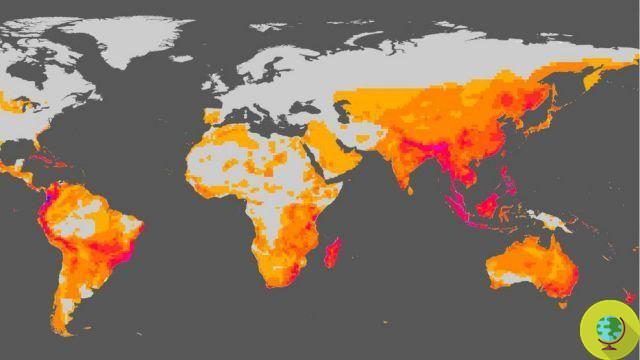
Over the next 20 years, we may experience losses equivalent to those that would naturally occur in 16.000 years
He is about to end up run over, his mother saves himLa sixth mass extinction it is accelerating at an ever more worrying rate and the fault is ours. Human activities are in fact rapidly and relentlessly destroying the natural world, leading to an unprecedented loss of ecosystems.
As a result, the extinction rate of living species is increasing faster and faster, far exceeding what would naturally be measured.
This is a crisis that poses a threat not only to thousands of animal and plant species, but to human civilization as a whole.
According to a new recent study published in Proceedings of the National Academy of Sciences, the time window for prevent catastrophe it will close in 10 or 15 years, much sooner than previously thought.
To determine how many species are on the verge of extinction, the study authors, led by ecologist Gerardo Ceballos Ceballos, analyzed available data on 29.400 species of amphibians, birds, mammals and reptiles.
Of these, 515 - or 1,7 percent - are in grave danger, with fewer than 1.000 remaining. About half of the endangered species include fewer than 250 individuals.
"In other words, every year over the last century we have lost the same number of species that we have typically lost in 100 years," said Dr. Ceballos.
According to the researchers, these losses will have a Domino effect which will affect other species, starting with those whose population is less than 5.000, and then affect the others as well.
In the absence of action, another 500 species of terrestrial vertebrates are likely to become extinct over the next twenty years, leading to losses equivalent to those that would naturally occur in 16.000 years.
The problem affects us all because, as the researchers point out, the survival of these animal species is linked to our own survival.
In fact, Dr. Ceballos and his colleagues warn that the extinction of animals and the failure of ecosystems will result in a series of cascading events that will lead to economic and social crises, as well as to spread of new diseases and the risk of pandemics, as happened with the new coronavirus.
“The Covid-19 vaccine was the natural habitat. The pandemic is a great example of how badly we have treated nature, ”said Dr Ceballos.
Coronavirus: at the origin of the epidemic the consumption of pangolin, a species at serious risk of extinction
The time to intervene is short, but according to the authors of the study we can still do something.
Stopping deforestation and the illegal trade in wild animals, favoring sustainability over profits, are the first urgent measures to be taken.
Deforestation in the Amazon is now out of control, just like Covid-19
In addition, targeted actions are needed to contain the effects of climate changes, significantly reducing the impact of our activities on the planet.
Political leaders around the world will therefore have to put the environment firstand, the protection of biodiversity and the redistribution of resources.
Through the global initiative Stop Ectinction, the authors of the study make themselves available to provide useful indications for the creation of new national agreements, as well as tools to educate and raise awareness of the population about the ongoing extinction crisis.
"We all need to understand that what we do in the next 5-10 years will define the future of humanity," said Dr Ceballos.
Sources of reference: PNAS / New York Times
Read also:
- The sixth mass extinction has already begun: this is what is happening
- The Earth is in the sixth phase of mass extinction: man among the first victims
- Donald Trump denies protection to this small mammal at risk of extinction due to deforestation and climate change
- The UN warns the world: we have less than 11 years to save the Earth's biodiversity. Protected areas are urgently needed


























